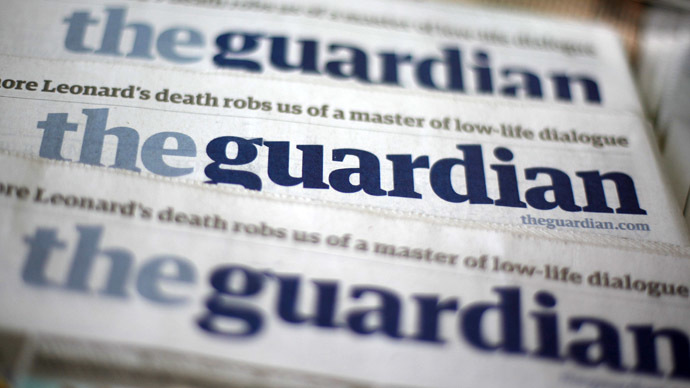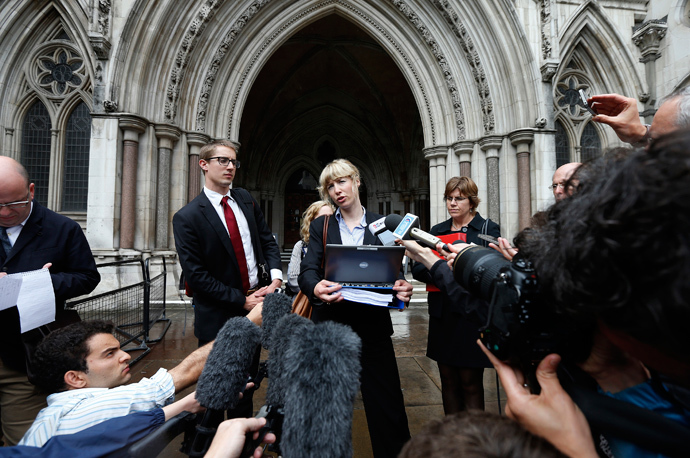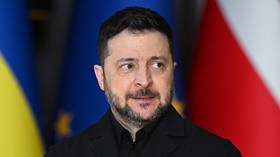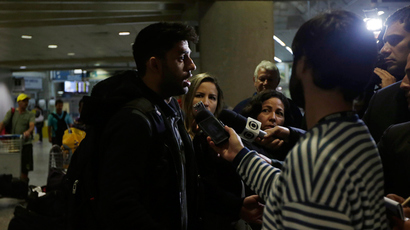Britain can look at Greenwald partner's seized electronic documents

British authorities can sift through electronic documents seized from journalist Glenn Greenwald’s Brazilian partner, in the interests of “national security”, a court ruled on Thursday. The “highly sensitive” material could risk lives, said UK police.
Two judges gave authorities until Aug. 30 to analyze “
thousands” of documents, according to a police lawyer.
“The home office and police now have seven days to prove that there is a genuine threat to national security, rather than make mere assertions as they have done today,” stated lawyer Gwendolen Morgan after the ruling was passed.
Late on Thursday afternoon, London police announced that the data
which had been seized includes "highly sensitive"
material, the disclosure of which "could put lives at
risk."
As the ruling was made, the judges said that UK authorities would
be able to examine the confiscated information for the purpose of
investigating whether Miranda is a person who is or has been
concerned with the commission, preparation or instigation of acts
of terrorism, alongside “national security” defense reasons.
However, the ruling fueled further concern about journalistic
freedoms worldwide and especially within the UK justice system
since the widely-debated introduction of 'secret courts' in
April.
“One of today’s troubling development was that the Secretary
of State indicated that she might use the controversial new
powers for closed material procedures. Both that, and the very
chilling effect of the implications of today’s judgment, are
something that journalists worldwide should be very concerned
about.”
The Guardian newspaper took the case to court on Thursday to demand the materials seized from Greenwald’s Brazilian partner be protected by injunction. “Confidentiality, once lost, can clearly never be restored,” said Morgan in a statement.

Lawyers requested that the High Court stepped in to prevent the
British government from “inspecting, copying or sharing”
the data they confiscated from the journalist, who had been
involved in releasing some of former NSA contractor Edward
Snowden’s documents.
They have asked that the injunction be in place “until the
legality of that seizure has been determined by this court”.
The 28 year old David Miranda, a Brazilian national, was detained
for nine hours last Sunday under Schedule 7 of the UK’s terrorism
act when he arrived at Heathrow Airport in transit to
Berlin.
Electronic materials – including computers and memory sticks -
were seized from him and he was threatened with prison if he did
not cooperate.
The court heard that around “tens of thousands of highly
classified documents" had been taken from Miranda.
Matthew Ryder, QC, who represents Miranda requested that police
reveal with whom they were sharing the information that they had
obtained as a result of Miranda’s materials being confiscated.
The Met police declared on Thursday that they have already opened
one criminal investigation as a result of the seized material.
However, further details as to whom and why have not yet been
provided.
“If interim relief is not granted, then the claimant is likely
to suffer irremediable prejudice, as are the other journalistic
sources whose confidential information is contained in the
material seized,” Morgan said, adding that the purpose of the
proceedings was to protect the confidentiality of the materials
seized by the UK government.
Morgan pointed out in a witness statement made on behalf of
Miranda that Schedule 7 had been invoked “for an improper
purpose and was therefore unlawful”, and the decision to use
it ran contrary to the European Convention on Human Rights.













